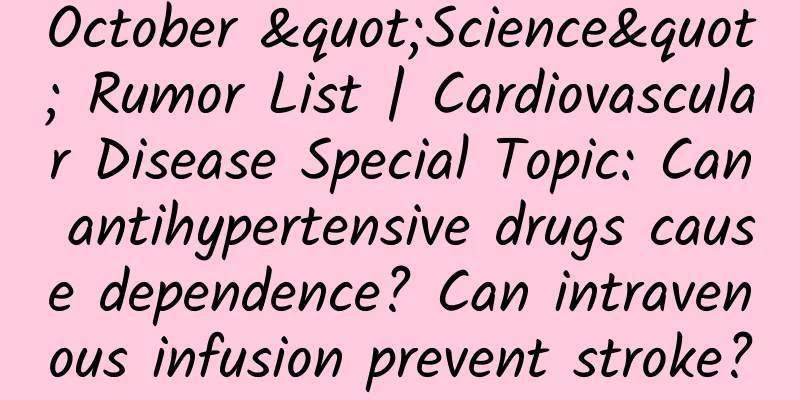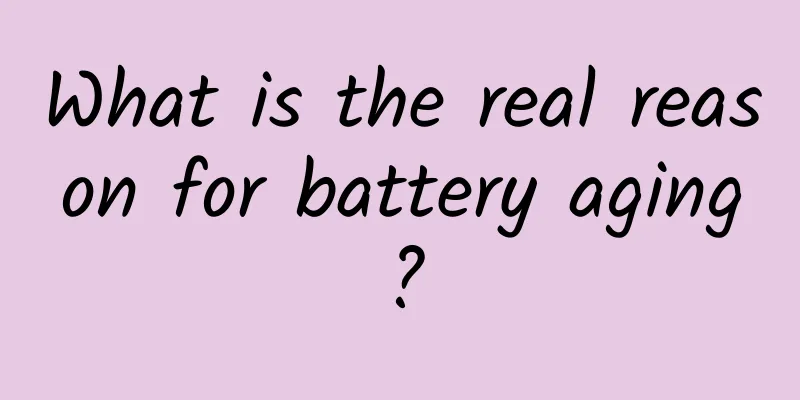October "Science" Rumor List | Cardiovascular Disease Special Topic: Can antihypertensive drugs cause dependence? Can intravenous infusion prevent stroke?

|
People with "three highs" cannot eat egg yolks? Can't do MRI after heart stent implantation? Can't take statins for a long time? The "Science" Rumor List of October 2021 reveals the truth for you. The monthly "science" rumor list is guided by the Beijing Association for Science and Technology, the Beijing Municipal Cyberspace Administration, and the Capital Internet Association, and jointly released by the Beijing Science and Technology Journalists and Editors Association and the Beijing Regional Website Joint Rumor-Refuting Platform, and is supported by the Science and Technology Journalists and Editors Professional Committee of the China Science Writers Association, the China Evening News Science Editors and Journalists Association, the Shanghai Science Communication Association, and the Beijing Institute of Scientific and Technological Information. Winter is cold, and cardiovascular and cerebrovascular diseases are more common. At this time of year, health rumors such as "cholesterol can be lowered by diet alone" and "statins cannot be taken for a long time" also begin to spread on social media under the guise of "reminders" and "folk remedies." In the October "Science" Rumor List, we have concentrated on refuting rumors related to cardiovascular and cerebrovascular diseases, hoping that readers will be clear-headed and recognize the truth. This issue's review experts: Wu Haiyun (Chief Physician of the Department of Internal Medicine, PLA General Hospital, and judge of the monthly “Science” Rumor List) Editor of this issue: Chen Yuehan (Editor of Journal of Geriatric Cardiology (English Edition) of PLA General Hospital) Ding Lin, Liu Zhao (Editors of Beijing Science and Technology Newspaper) 1. People with "three highs" should not eat egg yolks gossip: People with "three highs" should stay away from foods with high cholesterol. Therefore, when eating eggs, only the egg white can be eaten, and the high cholesterol yolk cannot be eaten. (Photo source/Visual China) the truth: Egg yolks do contain a lot of cholesterol, with one egg yolk containing up to 280 mg of cholesterol. However, most people's dietary cholesterol (such as from egg yolks) does not directly affect the cholesterol level in the blood. Cholesterol in the human body is mainly affected by genetic genes and metabolic factors. The absorption of dietary cholesterol by the human body and the effect of cholesterol on blood lipids vary greatly from person to person. Both the "Dietary Guidelines for Chinese Residents 2016" and the "Dietary Guidelines for American Residents 2015" have cancelled the previous dietary cholesterol limit (300 mg/day), believing that there is no evidence that more dietary cholesterol will lead to high blood lipids or heart disease. Egg yolk is rich in high-quality protein, monounsaturated fatty acids, lecithin, vitamin A, vitamin B1, calcium, zinc and other nutrients. Its overall nutritional value far exceeds that of egg white and it is the essence of egg nutrition. 2. Drinking Ginkgo Biloba in water can lower blood pressure gossip: Ginkgo leaves are not only a beautiful decoration, but also have high medicinal value. Drinking fresh ginkgo leaves in water can help lower blood pressure. (Photo source/Visual China) the truth: Although the 2020 edition of the Pharmacopoeia of the People's Republic of China states that ginkgo leaves have the effect of "promoting blood circulation, removing blood stasis and unblocking collaterals", this type of medicine is mainly used for chest pain, heart pain caused by blood stasis and obstruction of collaterals, hemiplegia caused by stroke, etc. (such as numbness of hands and feet, sore limbs in the elderly, or memory loss and inattention caused by reduced blood flow to the brain), and does not have the effect of lowering blood pressure. Moreover, it is very dangerous to drink ginkgo leaves soaked in water. Because raw ginkgo leaves contain a large amount of toxic ginkgolic acid, and ginkgolic acid is a water-soluble component, direct soaking can cause paroxysmal spasms, nerve paralysis, pupil dilation, allergies and other toxic side effects. 3. Drinking some red wine every day can soften blood vessels gossip: People who drink red wine regularly have a lower incidence of cardiovascular disease because the resveratrol in red wine can soften blood vessels. (Photo source/Visual China) the truth: Drinking red wine to soften blood vessels is not a reliable method. Red wine was once thought to have the effect of softening blood vessels because it contains resveratrol. But now we know that the content of resveratrol in red wine is very low, and even drinking 20 bottles of red wine a day will not have the effect of softening blood vessels. On the contrary, red wine contains about 15% alcohol, which can have a negative impact on cardiovascular function. In August 2018, the world's top journal "The Lancet" published an article stating that drinking directly caused the deaths of 2.8 million people worldwide. Many studies have confirmed that no matter how much alcohol is consumed, it is harmful to the human body. Alcohol is directly related to many diseases such as cardiovascular disease and cancer. If a large amount of alcohol is consumed, it can also cause serious problems such as digestive system tumors, alcoholic liver, and alcoholic cardiomyopathy. 4. If you have coronary heart disease, you can’t eat meat gossip: Patients with coronary heart disease cannot eat meat, especially fatty meat, animal offal, and animal oils, which are rich in saturated fatty acids and pose greater potential health risks. (Photo source/Visual China) the truth: Patients with coronary heart disease are not absolutely forbidden to eat meat, but they need to control the total amount. Patients with coronary heart disease should adhere to the dietary principles of "low salt, low fat, and low sugar", control the total fat content and the proportion of saturated fat in the diet (total fat intake generally does not exceed 30% of total energy, and saturated fatty acids generally do not exceed 10% of total energy), and consume sufficient monounsaturated fatty acids. 5. All patients with coronary heart disease should have heart stents placed gossip: Anyone suffering from coronary heart disease should undergo surgery to implant a heart stent to prevent myocardial infarction or sudden cardiac death. (Photo source/Visual China) the truth: Whether a heart stent is recommended depends on the type of coronary artery disease you have. For most patients with chronic stable coronary heart disease, heart stents cannot prevent myocardial infarction or sudden cardiac death, or can only slightly reduce the severity of angina pectoris. Patients should adopt comprehensive treatment measures, such as quitting smoking, exercising appropriately, and insisting on using necessary medications. On the other hand, for patients with acute myocardial infarction, timely use of coronary artery stents to open blocked blood vessels in the patient's heart can significantly reduce the patient's mortality rate and significantly improve the patient's quality of life after the attack. Therefore, after discovering acute myocardial infarction, as long as conditions permit, you should go to a regular medical institution to install a stent or perform a bypass surgery as soon as possible to open the blocked heart vessels. 6. Do not do MRI after implanting a heart stent gossip: Metal heart stents may shift in a strong magnetic field, and the heat generated by electromagnetic induction may burn blood vessels. Therefore, after a heart stent is implanted, MRI examinations cannot be performed. (Photo source/Visual China) the truth: The magnetic field strength of the commonly used MRI in clinical practice is 3.0T or 1.5T. Under a magnetic field strength of 3.0T, the heart stent will not move. Therefore, it is feasible to undergo an MRI examination immediately after the stent is implanted. In addition, in a magnetic field with a field strength of 3.0T, the temperature rise of the stent due to heat generated by current conduction will theoretically not exceed 2.6℃-4.7℃, and under the continuous flushing of blood flow in the blood vessels, the temperature rise of the stent is almost negligible. 7. Western medicine treatment of hypertension can cause dependence gossip: If you have high blood pressure, diabetes, etc., do not use Western medicine to treat it. Once you use these medicines, you can't stop taking them, and they will damage your liver and kidneys. (Photo source/Visual China) the truth: Most of the hypertension and diabetes can be treated with drugs. With the current medical level, most patients do need lifelong medication, but this is not drug dependence. On the other hand, the side effects of the drugs currently used to treat hypertension and diabetes are few and they basically do not "harm the liver or kidneys". As long as you follow the doctor's instructions and use the drugs correctly, the benefits far outweigh the harm. 8. Statins should not be taken for a long time gossip: The treatment of hyperlipidemia mainly relies on taking statins. However, statins have too many side effects and can cause damage to the liver, kidneys and muscles, so they cannot be taken for a long time. (Photo source/Visual China) the truth: Statins, like aspirin, are the "cornerstone drugs" for coronary heart disease. The new generation of statins is relatively safe, with almost no toxic side effects. When necessary, they should be taken according to the doctor's advice, and blood lipids, blood sugar, liver function, and muscle enzymes should be monitored regularly. 9. Infusion can prevent stroke gossip: Infusion in autumn and winter can dilate blood vessels and effectively prevent cerebral stroke. (Photo source/Visual China) the truth: "Infusion to prevent stroke" is a health care method that has more harm than good. People commonly call it cerebral stroke, which is called cerebral infarction in medical terms. It can be roughly divided into hemorrhagic stroke and ischemic stroke, both of which are caused by intracranial vascular lesions. Although both are strokes, their treatment methods are basically opposite. Ischemic stroke generally requires the use of thrombolytic and anticoagulant drugs, while hemorrhagic stroke generally requires hemostasis or surgical treatment. Once a stroke occurs, the treatment methods and effects are very limited. Therefore, it is particularly important to prevent stroke. However, the drugs used for infusion are often Chinese patent medicines that "activate blood circulation", which have no effect on controlling vascular stenosis and thrombosis. In addition, the "activating blood circulation" effect of infusion is also very short-lived. After the infusion is stopped, there is no effect, so it cannot be said to be preventive. There are many accurate and effective ways to prevent stroke. For example, for cerebral hemorrhage, the most important way to prevent it is to control blood pressure; and for ischemic stroke, the most important way to prevent it is not to smoke, to ensure proper exercise, to maintain a healthy diet, and to follow the doctor's advice and take some drugs to treat hypertension, diabetes, and hypercholesterolemia. In addition, about 20% of ischemic stroke is caused by heart disease. Therefore, patients with atrial fibrillation need to take anticoagulants for a long time (and must be taken under the guidance of a specialist). In short, just going to the hospital for infusion 2-3 weeks or a month a year cannot prevent stroke at all. Frequent infusion will not only waste a lot of medical resources, but also bring great health risks to the patient himself. Sources of this issue: Science Popularization China - Scientific Rumor Refuting, Doctor Cat's Medical Science Popularization, Guo Xiangping (Deputy Secretary-General of Beijing Medical Education Association), People's Daily Online - Science Popularization China, NetEase News: Cardiovascular Doctor Wang, People's Daily Online - Healthy Life, "Dr. Zhou Daliang" WeChat Official Account, Beijing Science and Technology Daily Produced by: Science Central Kitchen Produced by: Beijing Science and Technology News | Science Plus Client Welcome to share to your circle of friends Source: Science Central Kitchen |
<<: Is laser necessarily hot? When it is cooled, it is super cool
Recommend
How much does it cost to customize a luggage app in Baoding?
How much is the quotation for customized luggage ...
A collection of 27 early films by Ge You before 2002
Ge You became famous for his comedies and establi...
Extending the life expectancy of mice and monkeys? You can get this health "all-rounder" with just a little effort!
If you say there is something that can resist agi...
Under the epidemic, here are three key words for brand marketing to save themselves in 2020!
Under the epidemic, no industry or brand can rema...
1056 seconds! China's "artificial sun" EAST sets a new record for the longest discharge
On the evening of December 30, 2021, the world re...
Share a very profitable project photo resource station monetization project
Hello everyone, yesterday the editor shared with ...
LG is being criticized for withdrawing from China. What is the problem?
Since the beginning of this year, LG Electronics,...
How to plan an awesome online event!
How to plan a marketing campaign that is economic...
WeChat's anxiety may be more serious than you think
WeChat has been revamped, and many users who upda...
Like an alchemy furnace! The Inner Mongolia volcano can "spray" Ulan Hada and "spit" agate!
The Ulan Hada volcanic group is located in Chahar...
Willful "membrane"! Only allows carbon dioxide to "pass"?
Author: Mo Zunli and Lv Wenbo Recently, the lates...
SEO expert Zeng Liang Pinbei English Google SEO tutorial worth 8,000 yuan (Baidu network disk)
The official price of English SEO tutorial is 8,0...
When doing operations, should you work for a big company or a small company?
Each case has undergone in-depth information sear...
30 high-quality information flow advertising cases, data from 14 industries including education, finance, e-commerce, etc.
Friends often ask what constitutes a high-quality...
How to plan and promote an operational activity well?
Without further ado, here are the answers: 1. Cla...









